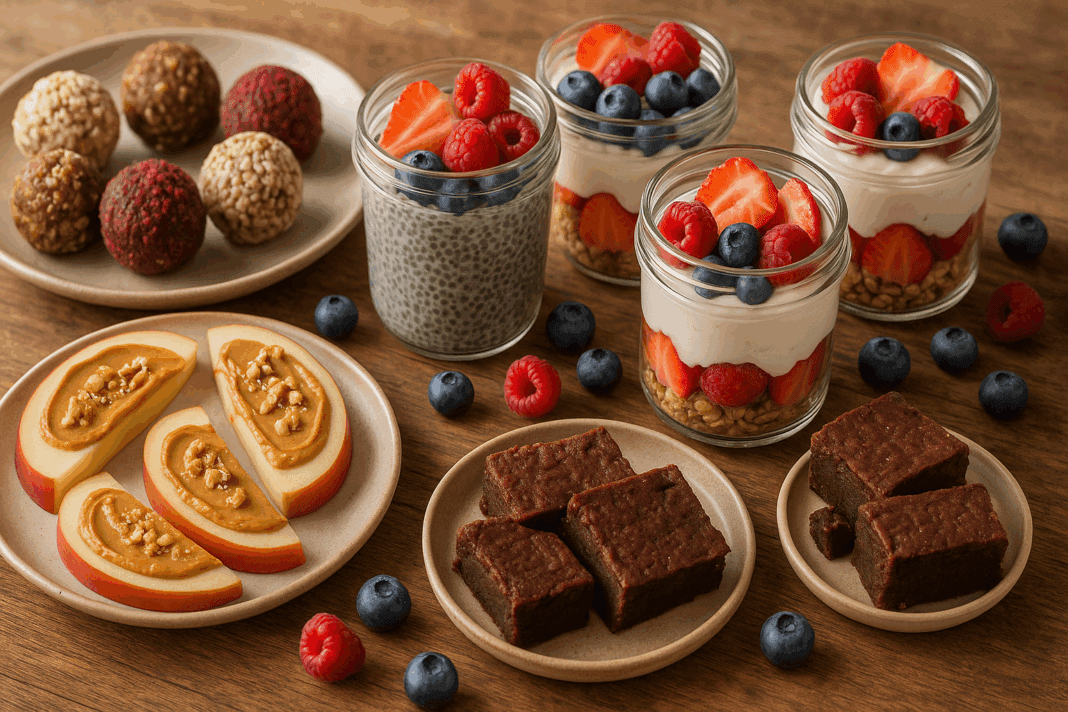The notion that healthy eating and indulgent snacking are mutually exclusive is a misconception that continues to fade, especially in the realm of plant-based nutrition. As more individuals adopt vegan and whole-food plant-based lifestyles, the demand for sweet snacks that align with these values has grown exponentially. Fortunately, sweet snacks for vegans have evolved beyond processed substitutes and empty-calorie treats. Today’s vegan-friendly sweets are both nourishing and satisfying, offering a delicious way to maintain a wholesome diet without sacrificing pleasure.
You may also like: Healthy Plant-Based Dinners Made Easy: Best Whole Food Plant-Based Recipes for Beginners and Beyond
Sweet snacks aren’t just an occasional indulgence—they serve as an important psychological and physiological tool for maintaining long-term adherence to plant-based eating. Understanding how to satisfy sweet cravings while still supporting health goals is key. Whether you’re navigating a transition to veganism, seeking healthier dessert alternatives, or simply looking to make better snacking choices, there’s a wide range of plant-powered options to explore. This article will dive into the science and strategy behind vegan snacks sweet enough to delight the palate while contributing to a healthy, balanced lifestyle.
The Psychology of Sweet Cravings and the Role of Vegan Snacks
Sweetness is a deeply ingrained preference in human biology. From infancy, humans are drawn to sweet tastes, which historically signaled calorie-dense, safe-to-eat foods in nature. In today’s world, however, this preference often leads to overconsumption of highly processed sugars and refined products that offer little nutritional value. Sweet cravings, particularly during times of stress or fatigue, can lead individuals to reach for convenience over consciousness. This is where mindful choices and preparation come into play.
Plant-based sweet snacks are not just alternatives to traditional treats—they are an opportunity to nourish both the body and mind. Unlike conventional sweets, which can cause blood sugar spikes and crashes, many vegan sweet snacks are made with whole foods that offer fiber, antioxidants, and complex carbohydrates. These qualities contribute to more stable energy levels, better mood regulation, and sustained satiety. Choosing vegan snacks sweetened with dates, fruit purées, or maple syrup instead of refined sugars allows for a more nutrient-dense way to fulfill cravings without sacrificing flavor or satisfaction.
Moreover, the act of preparing or selecting a smart sweet snack can foster a mindful eating practice. Engaging with your food—considering its ingredients, nutritional impact, and environmental footprint—can transform a simple snack into a deeply satisfying and health-affirming ritual. In this way, sweet snacks for vegans serve a dual role: pleasure and purpose.

Naturally Sweet Whole Foods: The Foundation of Healthy Vegan Snacks
At the core of many nutritious vegan snacks are naturally sweet whole foods that offer more than just good taste. Fruits, particularly dried fruits like dates, figs, apricots, and raisins, are nutrient powerhouses that provide natural sugars along with fiber, vitamins, and essential minerals. Dates, for example, are often referred to as nature’s candy—and with good reason. They are rich in potassium, magnesium, and antioxidants, and when blended with nuts or seeds, create a base for a variety of energy bars, truffles, and desserts.
Bananas are another versatile option, offering a creamy texture and enough natural sweetness to flavor baked goods, smoothies, and frozen treats. Apples, pears, and berries also shine in sweet vegan snacks, especially when paired with nut butters or layered into parfaits with non-dairy yogurt. These whole foods not only satisfy cravings but also support digestive health and blood sugar regulation due to their fiber content.
Root vegetables like sweet potatoes and carrots, although less commonly thought of as sweet snacks, bring a surprising natural sweetness when roasted or puréed. Sweet potato brownies and carrot cake energy bites are just two examples of how these ingredients can be transformed into healthy indulgences. By grounding sweet treats in whole, unprocessed ingredients, vegans can enjoy snacks that align with both their nutritional needs and ethical values.
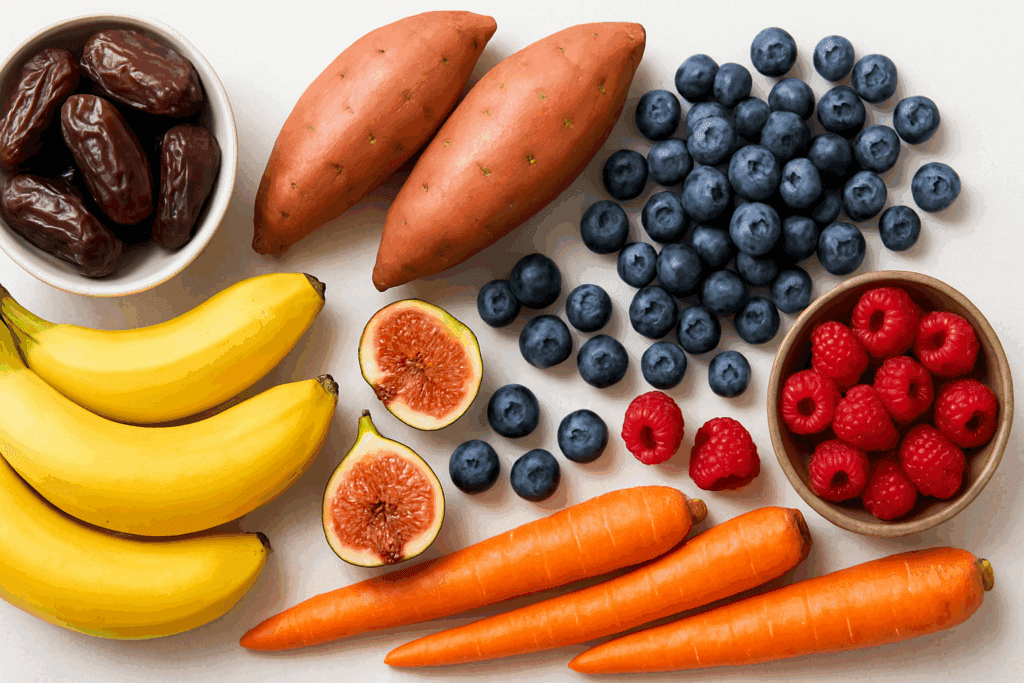
The Science of Sweetness: Glycemic Impact and Energy Stability
One of the main concerns about sweet snacking is its impact on blood glucose levels. Many traditional sweets are high on the glycemic index, meaning they cause rapid spikes in blood sugar followed by crashes that leave you hungry and tired. Sweet snacks for vegans, however, often feature ingredients with a lower glycemic impact, particularly when made from whole foods.
For instance, using dates or banana to sweeten recipes instead of white sugar introduces not only natural sugars but also fiber, which slows the absorption of glucose. When paired with healthy fats and proteins from nuts, seeds, or legumes, these snacks offer a more balanced nutritional profile. This combination helps prevent the energy rollercoaster associated with high-sugar foods, leading to improved focus and fewer cravings later in the day.
Moreover, ingredients such as chia seeds, oats, and almond butter enhance the functional value of sweet vegan snacks. Chia seeds, in particular, form a gel-like consistency when soaked, which slows digestion and promotes a prolonged sense of fullness. By understanding the physiological effects of various plant-based ingredients, snackers can better choose vegan snacks sweet enough to be enjoyable without compromising their well-being.
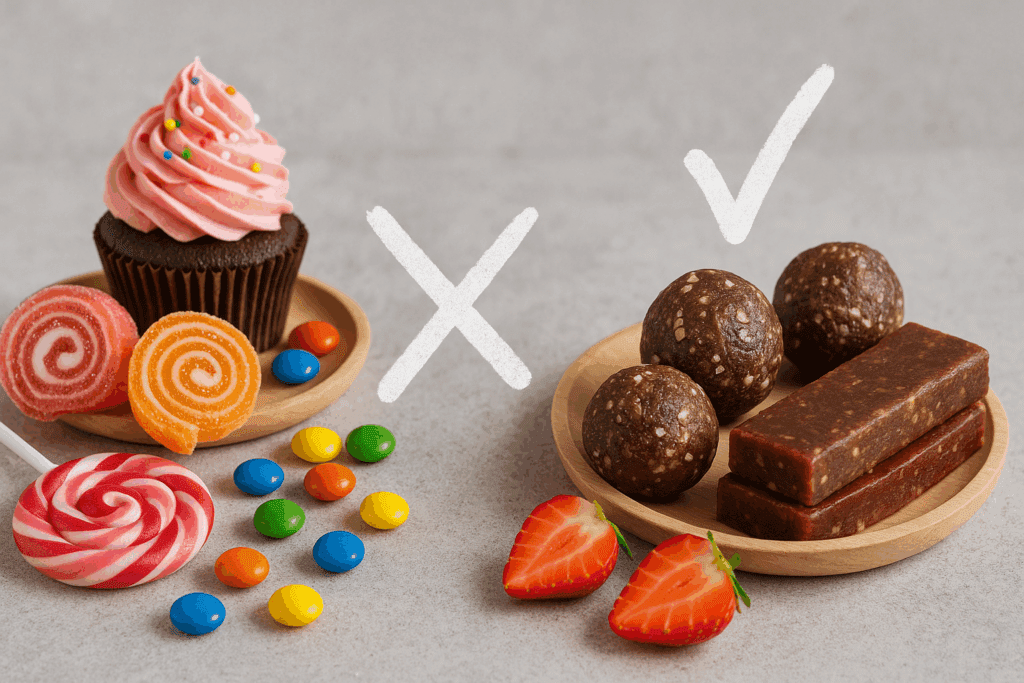
Decadence Without Dairy: Creating Creamy Vegan Delights
A common assumption is that removing dairy from sweet treats leads to a loss of creaminess and indulgence. However, with the right plant-based ingredients, vegan snacks can be just as rich and satisfying—if not more so. Coconut cream, soaked cashews, and plant-based milks like almond or oat milk serve as excellent bases for creamy desserts, ranging from mousses and puddings to frozen treats.
Coconut milk-based ice creams, when sweetened naturally and made without excessive additives, provide a luscious alternative to dairy options. Frozen banana “nice cream” is another popular option, made by blending frozen bananas until smooth. This treat is endlessly customizable—add cocoa powder for a chocolate twist, frozen berries for a sorbet-like experience, or peanut butter for a decadent, protein-packed version.
Cashew-based cheesecakes are another staple in the plant-based dessert world. By blending soaked cashews with lemon juice, coconut oil, and maple syrup, home cooks can craft smooth, rich cakes without a trace of animal products. These vegan sweet snacks offer indulgence without compromise, satisfying cravings while keeping dairy, cholesterol, and saturated fat off the plate.
Nutrient-Dense Vegan Bakes: From Breakfast Bars to Dessert Squares
Baked goods can often be the trickiest to navigate when adopting a plant-based diet. Many conventional recipes rely on eggs, butter, and refined sugar. Yet, the explosion of vegan baking innovations has made it easier than ever to create sweet snacks that are wholesome, satisfying, and completely plant-based. From hearty oatmeal breakfast bars to fudgy brownies and fruit-sweetened muffins, the possibilities are virtually endless.
Chickpea flour, flax eggs, and mashed bananas serve as effective egg substitutes, while coconut oil or avocado can replace butter in many recipes. Sweeteners like maple syrup, agave nectar, and date syrup allow for natural, lower-glycemic alternatives to processed sugar. Whole-grain flours and nut meals, such as almond or oat flour, add nutritional density and fiber, making these snacks not only delicious but also functional.
Additionally, vegan baked goods often allow for easy incorporation of superfoods such as cacao, hemp seeds, or spirulina. For instance, a dark chocolate zucchini brownie can offer antioxidants and fiber in every bite. These smart vegan snacks sweetened with whole food ingredients support plant-based health without sacrificing the familiar comforts of baked treats.
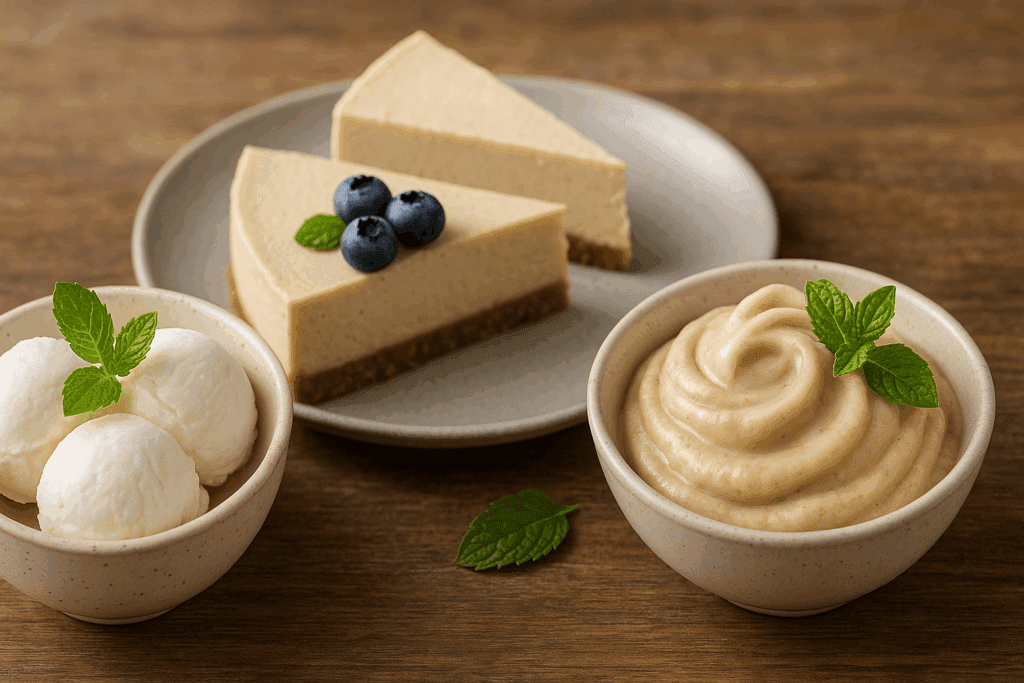
Satisfying Crunch: Sweet Vegan Snacks with a Crispy Edge
Crunch is a texture that many find deeply satisfying, and it plays an important role in how we experience food. Fortunately, sweet vegan snacks can deliver on this front too, offering crisp and crunchy options that are both delicious and nourishing. Roasted chickpeas coated with cinnamon and maple syrup provide a protein-rich, crunchy snack with a touch of sweetness. Similarly, granola clusters made with oats, nuts, seeds, and dried fruits make for a satisfying treat on their own or atop plant-based yogurt.
Homemade trail mixes, when assembled with intention, can become nutrient-dense snacks full of flavor and texture. Combining roasted almonds, dried cherries, coconut flakes, and dark chocolate chunks creates a balance of sweetness, crunch, and healthy fat. For those looking for lighter options, air-popped popcorn drizzled with a bit of coconut oil and sprinkled with cinnamon and coconut sugar is a fun and health-conscious indulgence.
Crispy fruit chips—like dehydrated apple slices or banana chips—also serve as naturally sweet, satisfying options. When made at home or selected from brands with minimal added sugar, they provide fiber and micronutrients in a snack that feels indulgent yet remains true to whole-food principles. These crunchy vegan snacks sweetened naturally show that plant-based eating can satisfy all aspects of the sensory experience.
Portable and Practical: Sweet Vegan Snacks for On-the-Go Lifestyles
In a world that moves fast, portability and convenience are essential. Fortunately, plant-based sweet snacks can be made to travel without compromising on taste or health. Energy balls—made from dates, oats, seeds, and nut butter—are one of the most convenient and versatile options. These compact bites are rich in energy, protein, and healthy fats, making them ideal for a quick boost between meals or after workouts.
Single-serving packs of almond butter paired with apple slices or whole grain crackers are another portable solution. Many store-bought vegan protein bars now use natural sweeteners and recognizable whole food ingredients, offering a more nutritious take on the traditional candy bar. While it’s still important to read labels carefully, the number of clean-label options has expanded significantly in recent years.
For longer travel or hiking trips, dehydrated fruit leathers made from puréed berries and bananas are a flavorful, lightweight choice. These can be homemade with minimal effort using a dehydrator or low-temperature oven. The growing variety of sweet snacks for vegans available on the market and in homemade formats ensures that no matter your schedule or setting, you can fuel your body with something that’s both delicious and aligned with plant-based values.
Sweet Snacks and Sustainable Health: More Than Just Treats
Snacking wisely isn’t just about preventing hunger between meals—it’s a strategy for maintaining metabolic health, supporting nutrient intake, and avoiding overindulgence later in the day. Vegan sweet snacks that emphasize whole ingredients can play a crucial role in this strategy. When chosen mindfully, these snacks provide not just energy but also phytonutrients, fiber, and antioxidants that support cardiovascular health, cognitive function, and even gut microbiome diversity.
For example, a chia pudding made with plant-based milk and topped with berries and a dash of maple syrup offers omega-3 fatty acids, fiber, and polyphenols in every serving. Similarly, dark chocolate with a high cacao content contains flavonoids linked to improved blood flow and reduced inflammation. When sweet cravings are met with thoughtful choices, they can enhance rather than detract from overall health.
From a behavioral standpoint, allowing space for sweet treats within a plant-based diet can foster a healthier, more sustainable relationship with food. Restrictive eating often leads to cycles of deprivation and overindulgence. But when vegan snacks sweeten your day with purpose and nourishment, they help create a positive feedback loop that reinforces consistency, satisfaction, and well-being.
Exploring Cultural and Seasonal Vegan Sweet Treats
One of the joys of plant-based snacking is discovering the diverse array of traditional and seasonal treats that can be adapted for a vegan lifestyle. Cultures around the world have long celebrated plant-based sweets, often relying on ingredients like coconut milk, rice, dates, and nuts—many of which naturally align with vegan principles. Middle Eastern date-filled pastries, Asian sweet rice cakes, or Latin American fruit-based paletas can be enjoyed or reimagined without animal products.
Seasonal ingredients like pumpkin, cranberries, or fresh summer peaches bring variety and excitement to vegan sweet snacks throughout the year. A pumpkin spice oat bar in autumn or a berry-chia frozen treat in summer makes snacking feel festive and fresh. These culinary experiences offer not only flavor but a deeper sense of connection to tradition, seasonality, and global food cultures.
By drawing on diverse influences and seasonal produce, vegans can enjoy sweet snacks that are rich in both taste and meaning. This not only keeps the palate engaged but helps support a more diverse and nutrient-rich diet over time.
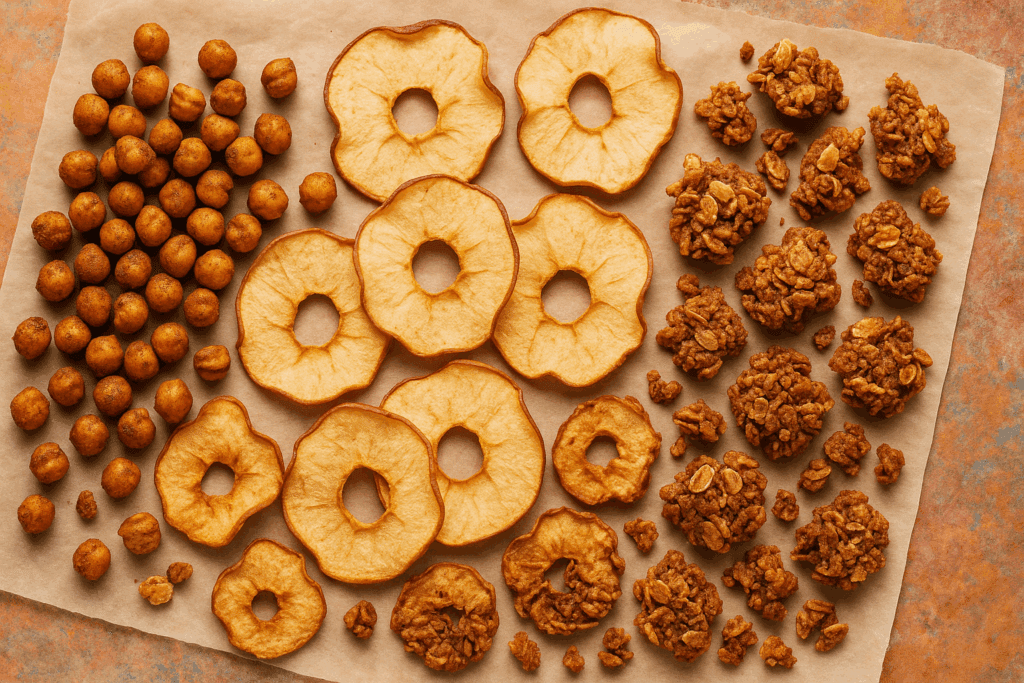
Frequently Asked Questions: Sweet Vegan Snacks for Health-Conscious Plant-Based Eaters
1. How can sweet snacks for vegans help reduce sugar cravings without compromising health goals?
Sweet snacks for vegans can satisfy cravings without the metabolic crash often associated with refined sugars. Many vegan snacks—sweetened naturally with dates, figs, or maple syrup—offer a slower glycemic response thanks to their fiber and micronutrient content. For example, a medjool date stuffed with almond butter delivers sweetness alongside healthy fats and magnesium, supporting both satiety and mood regulation. Choosing vegan snacks sweetened with whole-food ingredients trains the palate to appreciate natural flavors while reducing dependency on ultra-processed treats. Over time, these choices support improved insulin sensitivity and a more stable appetite rhythm, which can be especially beneficial for those pursuing weight management or hormonal balance.
2. What should you look for on labels when buying packaged vegan snacks sweet enough to satisfy dessert cravings?
When purchasing packaged sweet snacks for vegans, scrutinize the ingredient list rather than just relying on front-of-package claims. Look for whole-food sweeteners like date paste, fruit purées, or coconut sugar, which provide trace minerals and fiber. Be cautious of terms like “natural flavors” or “vegan sugar,” which can sometimes conceal ultra-processed or genetically modified ingredients. It’s also wise to check for added oils and emulsifiers—many sweet vegan snacks use palm oil, which can undermine cardiovascular health. Opting for brands that disclose third-party testing, use organic certification, or follow sustainability protocols reflects an EEAT-aligned commitment to both quality and transparency.
3. How can sweet vegan snacks support emotional eating without triggering guilt or overindulgence?
Sweet snacks for vegans can serve as a mindful alternative when navigating emotional eating, especially if chosen intentionally. Because many vegan snacks sweetened with fruits or nuts also contain fiber and phytonutrients, they tend to be more satiating than traditional confections. For instance, a few pieces of dark chocolate made with coconut sugar and embedded with goji berries can satisfy emotionally charged cravings while offering antioxidants and a mood-boosting magnesium hit. Developing a ritual—like pausing to savor a small bowl of naturally sweetened granola with almond milk—can shift emotional eating from reactive to reflective. This approach fosters a healthier relationship with food and self-awareness, reinforcing plant-based health goals over time.
4. Are there regional or cultural sweet vegan snacks that offer unique health benefits?
Absolutely. Sweet vegan snacks vary widely across cultures and often deliver distinct nutritional advantages. Take “Chikkis” from India—peanut or sesame seed brittle sweetened with jaggery—which combine plant protein, iron, and unrefined sugars in one crunchy bite. In the Middle East, stuffed dates with pistachios and rosewater are traditional vegan snacks sweetened naturally and rich in polyphenols. Latin American “cocadas,” made from shredded coconut and cane syrup, offer selenium and healthy fats. Exploring these global options not only diversifies your palate but also supports microbiome diversity—a key factor in metabolic and mental health. Cultural sweets, when made with whole ingredients, offer experiential eating that aligns with both enjoyment and longevity.
5. How do homemade sweet snacks for vegans compare nutritionally to store-bought options?
Homemade sweet vegan snacks often surpass commercial options in terms of nutrient density and transparency. When you prepare snacks yourself—like no-bake oat bites with dates, cacao, and chia—you control both the sweetness and the portion size. This ensures a balance of macronutrients (especially fiber and healthy fat) that’s often lacking in packaged versions. Many store-bought vegan snacks, though convenient, include hidden additives like gums or syrups that can irritate the gut or spike blood sugar. Moreover, homemade snacks offer opportunities to incorporate functional ingredients like flaxseed, maca, or cinnamon, each of which provides specific health benefits. Investing in a few easy recipes can yield snacks that nourish rather than merely entertain the palate.
6. What role do sweet vegan snacks play in supporting energy levels for plant-based athletes or busy professionals?
For athletes or high-performing individuals, vegan snacks sweet enough to deliver quick energy—without the crash—can be a game-changer. Dates, dried figs, and energy bars made from oats and nut butters provide a strategic mix of carbs and fat, ideal for both pre- and post-workout fueling. Sweet snacks for vegans rich in potassium, such as banana-based baked goods, help maintain electrolyte balance and reduce cramping. For those working long hours, combining a sweet component (like dried mango) with protein (like roasted chickpeas) can help stabilize blood sugar and enhance cognitive focus. In these cases, sweet vegan snacks become functional tools, not just indulgences, aligned with optimized physical and mental performance.
7. Can vegan snacks sweetened with fruit help improve gut health over time?
Yes, vegan snacks sweetened naturally with fruits like prunes, apples, or berries can serve as prebiotics—feeding beneficial gut bacteria. Unlike processed sugars that may promote dysbiosis, the fibers and polyphenols in fruit-based sweet vegan snacks support microbial diversity. For example, a chia pudding topped with kiwi and pineapple not only satisfies a sweet tooth but also introduces digestive enzymes and resistant starches. Over time, a diet that includes such snacks helps strengthen the gut lining, reduce inflammation, and improve mood-regulating neurotransmitter production like serotonin. Incorporating a variety of plant-based sweet snacks throughout the week ensures that your microbiome stays balanced and resilient.
8. How can parents encourage kids to enjoy sweet vegan snacks without relying on ultra-processed treats?
Introducing kids to sweet snacks for vegans early helps shape lifelong preferences for wholesome foods. Fun, interactive snacks like frozen banana pops dipped in dark chocolate or apple “donuts” topped with almond butter and raisins can make healthy choices exciting. Using storytelling—like explaining how dates come from desert trees or how cacao grows in rainforests—adds a learning element to snack time. Many vegan snacks sweet enough to rival candy bars can be made with just a few ingredients, teaching children that real food is both tasty and simple. Modeling positive eating behavior and offering consistent exposure builds food curiosity and supports long-term plant-based nutrition habits.
9. Are there emerging trends in sweet vegan snacks that align with clean-label or functional food movements?
The latest trends in sweet vegan snacks include the rise of adaptogenic ingredients (like ashwagandha, lion’s mane, and reishi) and protein-enhanced sweets made from pea, hemp, or pumpkin seed protein. Brands are also focusing on “clean label” formulations—minimal ingredients, no gums, and recognizable sources of sweetness like monk fruit or yacon syrup. Freeze-dried fruit crisps and beetroot brownies are gaining popularity for their antioxidant content and vibrant flavors. This wave of innovation supports the idea that vegan snacks sweet in flavor can also be highly functional, addressing everything from stress resilience to focus and immunity. As consumers demand both pleasure and performance from food, the line between snack and supplement continues to blur.
10. How can adults reframe their mindset around sweet vegan snacks to avoid feelings of guilt or indulgence?
Many adults carry the misconception that sweet equals “bad,” a belief often rooted in diet culture rather than evidence-based nutrition. Reframing vegan snacks sweetened with whole-food ingredients as opportunities for nourishment and joy can be transformative. For instance, enjoying a tahini-date ball or a slice of avocado-chocolate mousse after a long day isn’t indulgent—it’s a moment of self-care. When sweet snacks for vegans are chosen mindfully, they can promote emotional balance, creativity in the kitchen, and even social connection (like sharing a homemade treat with friends). Cultivating gratitude and intentionality around food helps shift the narrative from guilt to empowerment, a vital part of sustainable plant-based living.

Final Thoughts: Choosing Sweet Vegan Snacks That Nourish Body and Mind
Sweet snacks for vegans represent far more than a quick fix for sugar cravings. When approached with mindfulness and creativity, they become powerful tools for supporting physical health, emotional satisfaction, and dietary consistency. The best vegan snacks sweeten the day with intention, grounded in whole-food nutrition and the values of compassion and sustainability.
In a world saturated with highly processed foods, choosing plant-based sweet snacks that prioritize natural ingredients is a form of resistance against dietary norms that often undermine long-term health. Whether it’s a slice of cashew cheesecake, a handful of spiced nuts and fruit, or a spoonful of creamy chia pudding, each snack is an opportunity to celebrate the richness and pleasure that plant-based living can offer.
Ultimately, the key to a successful plant-based lifestyle is not about restriction but about abundance—finding joy in vibrant flavors, varied textures, and thoughtful nourishment. By embracing vegan snacks sweet enough to satisfy and smart enough to support overall health, we align our food choices with both personal wellness and the greater good. And that, perhaps, is the sweetest reward of all.

